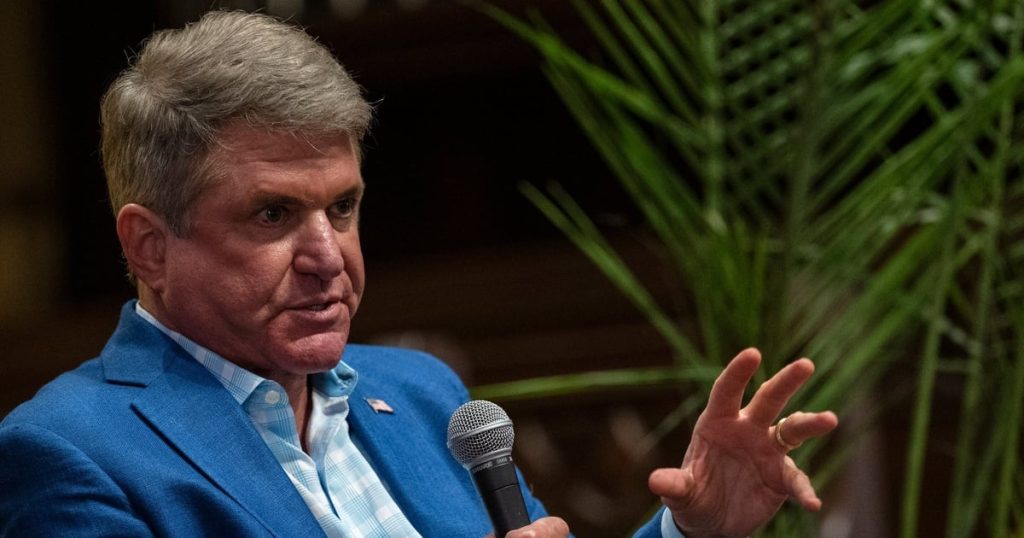
Texas Representative Michael McCaul has announced his retirement after serving 11 terms in Congress, a decision that has sparked celebration among conservatives online. Known to many as a RINO, or Republican in Name Only, McCaul has faced criticism for his pro-war stance and policies that are perceived as putting America last. This retirement is seen as a significant moment for conservative voters, as it opens the door for fresh candidates who align more closely with traditional conservative values.
The term RINO is frequently used by conservatives to describe politicians who abandon their principles once they reach Washington, D.C. In the case of McCaul, reactions have varied. One conservative woman on X, formerly known as Twitter, expressed her elation: “This RINO slob is quitting… y’all. @RepMcCaul can’t take the heat he’s been getting and apparently he’s smart enough to know what time it is. Good riddance to this anti-American piece of s**t. He’s as bad as a slimy democrat. Zero difference.” Her words reflect a broader sentiment among conservatives eager for change in leadership.
During his farewell tour, McCaul amplified his image concerns during an interview with ABC News. “It has been the honor of a lifetime to represent the people of central Texas and to chair the prestigious Homeland Security and Foreign Affairs Committees,” he claimed, attempting to frame his long service as a noble endeavor. Yet, many see this effort as disconnected from the realities of his tenure, in which he frequently clashed with the Trump administration.
As he reflected on his time in Congress, McCaul expressed worries about the current state of global politics. “We’ve never seen anything like this in recent times… what I’m concerned about is that the escalation here and the temperature rising. We’ve got to be very careful not to be on the precipice of a World War III,” he asserted. This dramatic concern highlights a tendency among some lawmakers to amplify threats rather than address domestic issues directly affecting their constituents.
Also Read : Disturbing New Footage Shows Would-Be Trump Assassin Showing Off Weapons
McCaul’s relationship with Trump has been contentious. He criticized Trump’s foreign policy decisions, stating, “With all deference to the president, I don’t think that was a mistake. I think Putin is testing the resolve of NATO.” This statement indicates a larger division within the Republican Party, where many supporters of Trump genuinely believe in a different approach to foreign relations, one that emphasizes America-first policies over traditional interventionist stances.
Further complicating matters, McCaul implied that Trump’s strategy was flawed, saying, “I never had any good faith anticipation of these negotiations.” His assertions reveal a reluctance to fully back the president, which many within the MAGA movement view as a betrayal of shared goals. Such criticisms underscore the challenges faced by politicians who seek to balance party loyalty with personal political beliefs.
Continuing with dire predictions, McCaul stated, “Putin is a KGB once and always… I don’t think he’s playing fair. I think he’s manipulating the president, as a KGB officer would.” These remarks seem aimed at reinforcing his pro-war perspective, appealing to fears of foreign aggression while failing to resonate with voters who prioritize domestic issues above international conflicts.
In his conclusions, McCaul noted, “It’s been an honor to serve for over two decades in Congress… I’m looking now for a new challenge.” This parting remark hints at a desire to remain relevant in political discussions, perhaps still seeking a role in national security or foreign policy. Yet, for many conservatives, his departure will be a sign of hope rather than loss. They look forward to new representatives who might better reflect core conservative values.
Also Read : John Bolton’s Legal Woes Deepen After ‘Secret’ Docs Are Found At His Office
Overall, McCaul’s retirement symbolizes a turning point. It represents a shift away from established RINOs and paves the way for potential leaders who prioritize America-first policies. As the landscape of the Republican Party continues to evolve, the reactions to McCaul’s departure will likely echo through upcoming elections, shaping the future of conservative representation in Congress.




2 thoughts on “JUST IN: RINO Texas Rep. McCaul Announces Retirement Amid Conservative Cheers”